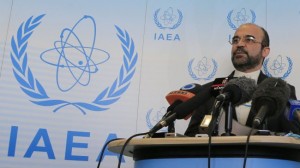 (Reuters) - The U.N. nuclear watchdog signaled on Wednesday it would press�Iran�at talks in Tehran next month over concerns the Islamic Republic may have researched how to develop atomic bombs.
(Reuters) - The U.N. nuclear watchdog signaled on Wednesday it would press�Iran�at talks in Tehran next month over concerns the Islamic Republic may have researched how to develop atomic bombs.Chief U.N. nuclear inspector Tero Varjoranta made the comments after what he and Iranian envoy Reza Najafi both described as a "productive" meeting held at the Vienna headquarters of the International Atomic Energy Agency (IAEA).
They said they had reviewed progress in implementing the initial steps of a cooperation pact the two sides signed last month, under which�Iran�agreed to grant the U.N. agency access to two nuclear-related sites within three months.
The agreement is meant to help allay international concerns about Iran's disputed nuclear program through a series of measures by Tehran to gradually open it up to greater scrutiny.
Varjoranta said work under the November 11 accord was "proceeding as planned". Najafi, standing next to him, said: "We had a very good meeting today."
Asked about the IAEA's concerns over what it calls the possible military dimensions to Iran's nuclear program, Varjoranta said: "We envisage that this ... will be discussed in our next meeting", to be held in Tehran on January 21.
Iran says it is only refining uranium to fuel a planned network of nuclear power plants. But the same material can also provide the fissile core of an atomic bomb if enriched more.
The IAEA-Iran agreement is separate from a breakthrough deal between�Iran�and six world powers reached on November 24 to curb Tehran's nuclear program in return for a limited easing of sanctions that have battered the country's economy.
But both deals signaled a rapid thaw in Iran's ties with the outside world, made possible by the election of a relative moderate, Hassan Rouhani, as president on a platform of ending Iran's international isolation.
CHANGE IN TACTICS
On Sunday, the IAEA was allowed to visit the Arak heavy-water plant for the first time in two years, a facility that is linked to a reactor under construction that the West fears could yield plutonium for bombs once it is operational.
Varjoranta said his inspectors would go to the Gchine uranium mine before February 11, when Iran is due to have implemented the six practical steps it signed up to last month. It would be the first inspection of Gchine since 2005.
The other measures to be carried out within three months concerned provision of information about uranium enrichment plants and research reactors Iran has said it plans to build.
Diplomats say these six steps are relatively easy to implement but it will be more difficult for Iran to agree to future action sought by the IAEA, including access to the Parchin military site where the U.N. agency believes nuclear weapons-relevant explosives tests took place a decade ago.
An Iran-IAEA statement said "we aim at reaching agreement" on measures by Iran under the next phase of cooperation, to start in February, but it did not specify what those might be.
The U.N. agency says it needs access to officials, sites and documents in Iran for its long-stalled investigation into suspected atomic bomb research. Two years ago, it published a report with intelligence indicating past work that could be relevant for developing atomic bombs.
Last month's IAEA-Iran deal signaled a change in tactics after almost two years of fruitless negotiations focused on Parchin and other sensitive issues.
"This new approach starts with less controversial transparency issues but in subsequent phases ... it will address the main IAEA concerns over the possible military dimensions to Iran's nuclear program," the Institute for Science and International Security, a U.S. think-tank, said.
By Reuters
The Iran Project is not responsible for the content of quoted articles.










